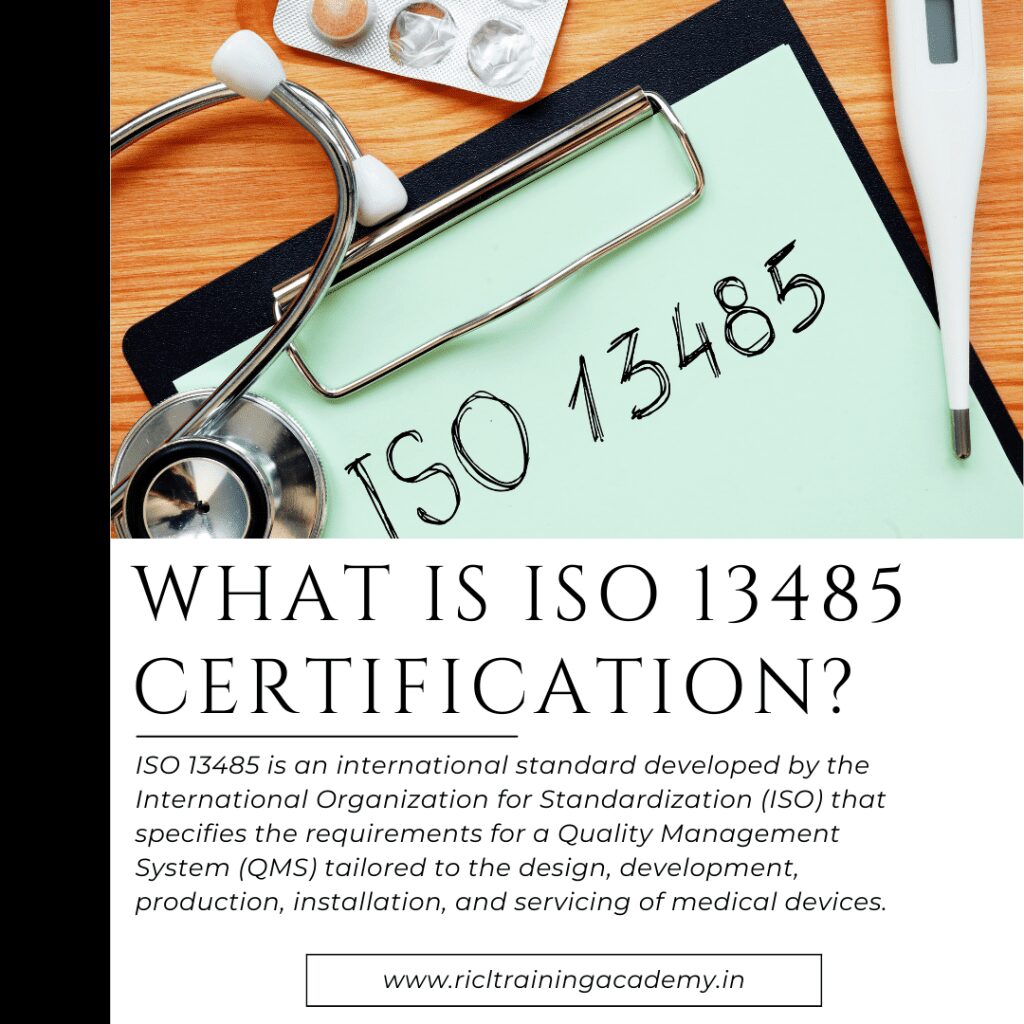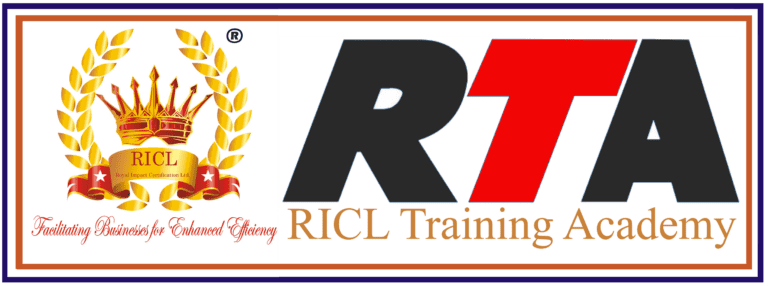ISO 13485 certification for medical devices. Discover its requirements, benefits, and how it ensures quality management in healthcare is an international standard that specifies requirements for a quality management system (QMS) for organizations involved in the design, development, production, installation, and servicing of medical devices and related services
What is ISO 13485 Certification?

ISO 13485 certification is an international standard that specifies requirements for a quality management system (QMS) for organizations involved in the design, development, production, installation, and servicing of medical devices and related services. It is specifically tailored for the medical device industry and emphasizes compliance with regulatory requirements and the need for effective risk management throughout the product lifecycle.
Overview of ISO 13485 Certification
ISO 13485:2016, titled “Medical devices – Quality management systems – Requirements for regulatory purposes,” is recognized globally and provides a framework for organizations to ensure they consistently meet customer and regulatory requirements applicable to medical devices. Here are the key components and requirements of ISO 13485:
Key Components of ISO 13485
Management Responsibility: Top management must demonstrate leadership and commitment to the QMS. This includes establishing a quality policy, ensuring the QMS is implemented and maintained, and conducting management reviews to evaluate its effectiveness.
Resource Management: Adequate resources, including personnel, infrastructure, and work environment, must be provided to implement and maintain the QMS effectively.
Product Realization: This section covers all stages of the product lifecycle, from design and development through production, installation, and servicing. It includes processes for design and development planning, risk management, verification and validation, and control of changes.
Measurement, Analysis, and Improvement: Organizations must establish processes for monitoring and measuring product quality and QMS performance. This includes internal audits, corrective and preventive actions, and continual improvement initiatives based on data and feedback.
Benefits of ISO 13485 Certification
Enhanced Product Quality: Implementing ISO 13485 helps organizations establish robust processes that contribute to the production of safe and effective medical devices.
Compliance with Regulatory Requirements: Certification demonstrates conformity with regulatory requirements in different markets, facilitating market access and regulatory approvals.
Improved Customer Confidence: Certification enhances customer confidence by demonstrating a commitment to quality and regulatory compliance in the medical device industry.
Operational Efficiency: Streamlined processes and effective risk management contribute to improved operational efficiency, reduced waste, and optimized resource allocation.
Global Market Access: ISO 13485 certification is recognized internationally, facilitating access to global markets and enhancing competitiveness.
ISO 13485 Certification Process
Gap Analysis: Assess current processes against ISO 13485 requirements to identify gaps and areas for improvement.
Implementation: Develop and implement a QMS based on ISO 13485 standards, including policies, procedures, and documentation.
Internal Audit: Conduct internal audits to evaluate the effectiveness and compliance of the QMS with ISO 13485 requirements.
Certification Audit: An accredited certification body conducts a formal audit to assess the organization’s QMS. Certification is granted if the organization meets ISO 13485 requirements.
Surveillance Audits: Periodic audits are conducted to ensure ongoing compliance and continual improvement of the QMS. Certification is typically valid for a specified period, subject to surveillance audits.
Integration with Other Management Systems
ISO 13485 is aligned with the High-Level Structure (HLS) common to all ISO management system standards, facilitating integration with other standards such as ISO 9001 (Quality Management) and ISO 14001 (Environmental Management). Integration allows organizations to streamline management processes, improve overall performance, and achieve synergies in quality, environmental responsibility, and regulatory compliance.
Conclusion
ISO 13485 certification is crucial for organizations involved in the medical device industry, ensuring they establish and maintain effective quality management systems. It supports compliance with regulatory requirements, enhances product quality and safety, and fosters customer confidence. By achieving ISO 13485 certification, organizations demonstrate their commitment to maintaining high standards of quality and regulatory compliance in the development and manufacturing of medical devices.
Lead Auditor & Internal Auditor Training: QMS, EMS, OHSMS + Awareness Courses
Refine your know-how in Quality Management Systems by taking our all-inclusive Lead Auditor QMS training course. We equip you with skills necessary for effective auditing as well as ensuring conformance with ISO standards. It is an excellent resource for people who want to become professionals in QMS auditing through detailed knowledge and practical information.”
Become a certified Lead Auditor in Environmental Management Systems with our specialized training course. This program offers necessary know-how and skills for conducting effective inspections while also promoting environmental compliance according to ISO regulations. The perfect opportunity for those looking to progress their career further into the realm of environmental management”
Pursue your career growth using our Lead Auditor OHSMS training course, which is tailored towards equipping you with the skills needed to undertake comprehensive evaluations of Occupational Health and Safety Management Systems. Obtain practical capabilities as well as experience that guarantee individual workplaces’ security conformity with the most recent ISO requirements”.
Our Internal Auditor QMS training can help you improve your auditing skills. This course covers the principles and practices necessary for conducting internal audits of Quality Management Systems. Ideal for professionals looking to increase their understanding of QMS and contribute to organizational excellence.
Our Internal Auditor EMS course will help you enhance your skills in environmental auditing. Learn techniques and standards needed to implement efficient internal audits of environmental management systems, ensuring ISO compliance and its environmental sustainability.
The purpose of our Internal Auditor OHSMS training is to equip you with the necessary skills to conduct effective internal audits. This course gives an extensive overview on how to audit Occupational Health & Safety Management Systems so that you can achieve compliance and create a safe workplace.
Hone your understanding of Quality Management Systems (QMS) through our Awareness Auditor QMS. These courses provide a basic understanding of the principles, benefits and implementation strategies of QMS making them instrumental for improving quality management practices by individuals or teams.
Familiarize yourself with essential knowledge regarding the Environmental Management Systems by exploring our Awareness Auditor EMS. The courses offer an overview of the principles of EMS which will help you comprehend environmental policies and procedures along with their importance in achieving sustainability targets.
Out training programs on Occupational Health and Safety Management Systems are meant to improve your awareness in this field. This course is intended for organizations and individuals, they provide essential information on OHSMS principles and practices that lead to safer and compliant work environments.
Other Blogs
- Adaptability Thrive in a Dynamic World
- Artistic Sense Elevate Expression & Drive Innovation
- Body Language A Key Form of Non-Verbal Communication
- Business Ethics: Upholding Integrity and Sustainability
- Business Etiquette Cultivating Professionalism and Success
- Business Trend Awareness Stay Ahead & Drive Success
- Collaboration Foster Synergy for Collective Success
- Competitiveness Driving Excellence & Superior Performance
- Conflict Resolution Navigate Tensions for Positive Results
- Crisis Management Strategic Response & Communication
- Critical Thinking Empower Strategic Decisions
- Customer Service Excellence: Fostering Relationships and Driving Success
- Customizing ISO Training for Different Industry Needs: A Tailored Approach
- Dealing with Difficult People Constructive Interaction Tips
- Decision Making: Strategies for Complex Environments
- Delegation Strategic Empowerment for Success
- Design Sense Inspire Creativity & Spark Innovation
- Diplomacy Navigate Relationships & Achieve Goals
- Disability Awareness Embracing Inclusion and Empowerment
- Dispute Resolution Foster Collaboration & Harmony
- Diversity Awareness Fostering Inclusion and Collaboration
- Empathy Enhance Understanding & Build Stronger Connections
- Entrepreneurial Thinking Cultivating Innovation and Initiative
- Facilitation Enhance Group Dynamics Effectively
- Feeling Stagnant in Your Career? Start Here
- Giving Feedback Bridging Performance Gaps Effectively
- Humor A Universal Aspect of Human Experience
- Inspiring Cultivate Authentic Leadership
- Interviewing Skills Effective Communication in Recruitment
- ISO 14001 Lead Auditor Courses PDF Download
- ISO 14001 Lead Auditor Courses Study Material
- ISO 14001: Environmental Management Training Essentials
- ISO 22301 Internal Auditor Courses Material Download
- ISO 22301 Lead Auditor Courses Fees
- ISO 22301 Lead Auditor Courses Material Download
- ISO 22301 Lead Auditor Courses PDF Download
- ISO 30000 Internal Auditor Courses Material Download
- ISO 37001 Lead Auditor Courses PDF Download
- ISO 37001 Lead Auditor Courses Study Material
- ISO 41001 Internal Auditor Courses Material Download
- ISO 41001 Lead Auditor Courses Material Download
- ISO 41001 Lead Auditor Courses PDF Download
- ISO 41001 Lead Auditor Courses Study Material
- ISO 45001 Internal Auditor Courses Material Download
- ISO 45001 Lead Auditor Courses Fees
- ISO 45001 Lead Auditor Courses Material Download
- ISO 45001 Lead Auditor Courses PDF Download
- ISO 45001 Lead Auditor Courses Study Material
- ISO 50001 Internal Auditor Courses Material Download
- ISO 50001 Lead Auditor Courses Fees
- ISO 50001 Lead Auditor Courses Material Download
- ISO 50001 Lead Auditor Courses PDF Download
- ISO 50001 Lead Auditor Courses Study Material
- ISO 50001 Energy Management Training for Sustainability
- ISO 9001 Certification A Comprehensive Training Guide
- ISO 9001 Internal Auditor Courses Material Download
- ISO 9001 Lead Auditor Certificate Course
- ISO 9001 Lead Auditor Certification in India
- ISO 9001 Lead Auditor Courses Benefits
- ISO 9001 Lead Auditor Courses Cost
- ISO 9001 Lead Auditor Courses Exam Question and Answers
- ISO 9001 Lead Auditor Courses Fees
- ISO 9001 Lead Auditor Courses Fees
- ISO 9001 Lead Auditor Courses Fees in Chennai,Noida,Delhi
- ISO 9001 Lead Auditor Courses PDF Download
- ISO 9001 Lead Auditor Courses Study Material
- ISO Certification in Delhi NCR
- ISO Certification in India
- ISO Certification in Noida
- ISO Full Form
- ISO Lead Auditor Training Near Noida
- ISO Training for New Employees: Onboarding and Integration Best Practices
- Latest ISO Training Courses & Certificates
- Lead Auditor Certification
- Lead Auditor Course
- Lead Auditor ISO 14001 Course
- Lead Auditor ISO 22000 Course
- Lead Auditor ISO 45001 Course
- Lead Auditor ISO 9001 Course
- Lead Auditor Online Courses
- Lead Auditor Salary
- Lead Auditor Training
- Lead Auditor Training Provider in Delhi
- Lead Auditor Training Provider in India
- Lead Auditor Training Provider in Noida
- Listening The Cornerstone of Effective Communication
- Adaptability Thrive in a Dynamic World
- Artistic Sense Elevate Expression & Drive Innovation
- Body Language A Key Form of Non-Verbal Communication
- Business Ethics: Upholding Integrity and Sustainability
- Business Etiquette Cultivating Professionalism and Success
- Business Trend Awareness Stay Ahead & Drive Success
- Collaboration Foster Synergy for Collective Success
- Competitiveness Driving Excellence & Superior Performance
- Conflict Resolution Navigate Tensions for Positive Results
- Crisis Management Strategic Response & Communication
- Critical Thinking Empower Strategic Decisions
- Customer Service Excellence: Fostering Relationships and Driving Success
- Customizing ISO Training for Different Industry Needs: A Tailored Approach
- Dealing with Difficult People Constructive Interaction Tips
- Decision Making: Strategies for Complex Environments
- Delegation Strategic Empowerment for Success
- Design Sense Inspire Creativity & Spark Innovation
- Diplomacy Navigate Relationships & Achieve Goals
- Disability Awareness Embracing Inclusion and Empowerment
- Dispute Resolution Foster Collaboration & Harmony
- Diversity Awareness Fostering Inclusion and Collaboration
- Empathy Enhance Understanding & Build Stronger Connections
- Entrepreneurial Thinking Cultivating Innovation and Initiative
- Facilitation Enhance Group Dynamics Effectively
- Feeling Stagnant in Your Career? Start Here
- Giving Feedback Bridging Performance Gaps Effectively
- Humor A Universal Aspect of Human Experience
- Inspiring Cultivate Authentic Leadership
- Interviewing Skills Effective Communication in Recruitment
- ISO 14001 Lead Auditor Courses PDF Download
- ISO 14001 Lead Auditor Courses Study Material
- ISO 14001: Environmental Management Training Essentials
- ISO 22301 Internal Auditor Courses Material Download
- ISO 22301 Lead Auditor Courses Fees
- ISO 22301 Lead Auditor Courses Material Download
- ISO 22301 Lead Auditor Courses PDF Download
- ISO 30000 Internal Auditor Courses Material Download
- ISO 37001 Lead Auditor Courses PDF Download
- ISO 37001 Lead Auditor Courses Study Material
- ISO 41001 Internal Auditor Courses Material Download
- ISO 41001 Lead Auditor Courses Material Download
- ISO 41001 Lead Auditor Courses PDF Download
- ISO 41001 Lead Auditor Courses Study Material
- ISO 45001 Internal Auditor Courses Material Download
- ISO 45001 Lead Auditor Courses Fees
- ISO 45001 Lead Auditor Courses Material Download
- ISO 45001 Lead Auditor Courses PDF Download
- ISO 45001 Lead Auditor Courses Study Material
- ISO 50001 Internal Auditor Courses Material Download
- ISO 50001 Lead Auditor Courses Fees
- ISO 50001 Lead Auditor Courses Material Download
- ISO 50001 Lead Auditor Courses PDF Download
- ISO 50001 Lead Auditor Courses Study Material
- ISO 50001 Energy Management Training for Sustainability
- ISO 9001 Certification A Comprehensive Training Guide
- ISO 9001 Internal Auditor Courses Material Download
- ISO 9001 Lead Auditor Certificate Course
- ISO 9001 Lead Auditor Certification in India
- ISO 9001 Lead Auditor Courses Benefits
- ISO 9001 Lead Auditor Courses Cost
- ISO 9001 Lead Auditor Courses Exam Question and Answers
- ISO 9001 Lead Auditor Courses Fees
- ISO 9001 Lead Auditor Courses Fees
- ISO 9001 Lead Auditor Courses Fees in Chennai,Noida,Delhi
- ISO 9001 Lead Auditor Courses PDF Download
- ISO 9001 Lead Auditor Courses Study Material
- ISO Certification in Delhi NCR
- ISO Certification in India
- ISO Certification in Noida
- ISO Full Form
- ISO Lead Auditor Training Near Noida
- ISO Training for New Employees: Onboarding and Integration Best Practices
- Latest ISO Training Courses & Certificates
- Lead Auditor Certification
- Lead Auditor Course
- Lead Auditor ISO 14001 Course
- Lead Auditor ISO 22000 Course
- Lead Auditor ISO 45001 Course
- Lead Auditor ISO 9001 Course
- Lead Auditor Online Courses
- Lead Auditor Salary
- Lead Auditor Training
- Lead Auditor Training Provider in Delhi
- Lead Auditor Training Provider in India
- Lead Auditor Training Provider in Noida
- Listening The Cornerstone of Effective Communication

TESTIMONIALS
What Our Cutomers are Saying About us

Ruis aute irure dolor in reprehender voluptate velit esse cillum dolore fugiat pariatur sint occaecat cupidata non proie sunt in culpa aui officede









Reach us at:
info@ricltrainingacademy.in
support@ricltrainingacademy.in
sales@ricltrainingacademy.in
complaint@ricltrainingacademy.in
Call us at:
9355650992
9355650993
Visit us at:
Royal Impact Certification Limited
623 Tower -B, The Ithum Sector – 62, Noida, 201301.
Copyright © 2024 RICL Training Academy Team


